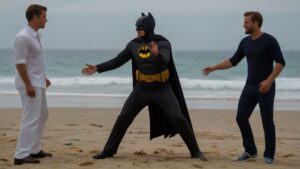The Origins of a Misattributed Quote
Leonardo da Vinci, an Italian polymath of the Renaissance era, is known for his contributions to various fields including art, science, engineering, and anatomy. His remarkable achievements have made him an iconic figure in history. However, there is a popular quote often attributed to da Vinci that states: “When once you have tasted flight, you will forever walk the earth with your eyes turned skyward. For there you have been, and there you will always long to return.” Surprisingly, recent research reveals that da Vinci never actually uttered these words. Instead, their origin can be traced back to a 1965 TV episode about da Vinci, written by John Secondari, an American TV writer.
Unraveling the Truth
The misattribution of this quote to Leonardo da Vinci brings to light the significance of fact-checking and the spread of misinformation over time. While the words are beautifully captivating, it is essential to rely on accurate information and avoid perpetuating false claims. Understanding the true origins of this quote allows us to appreciate da Vinci’s genuine accomplishments without misleading narratives.
Frequently Asked Questions
Here are some commonly asked questions regarding the misattributed quote and its origins:
Q1: What is the TV episode that initially used this quote?
The quote was first presented in a 1965 TV episode about Leonardo da Vinci. The episode was written by John Secondari, an American TV writer, who created the quote as a powerful dramatic element for the show.
Q2: How did the quote gain popularity and become mistakenly attributed to da Vinci?
After its inclusion in the TV episode, the quote gradually gained popularity and was associated, over time, with da Vinci’s name. This common misconception highlights the potential for misinterpretations and the spread of misinformation.
Q3: Why does the quote resonate with people even though it was not spoken by da Vinci?
The quote resonates with people due to its poetic and profound nature. It captures the spirit of exploration, the love for the skies, and the longing for a perpetual connection to our dreams. Even though it wasn’t da Vinci’s own words, its sentiment continues to inspire individuals around the world.
Q4: What can we learn from this misattribution?
This misattribution teaches us the importance of verifying information before accepting it as fact. It serves as a reminder that we should not blindly trust quotes attributed to historical figures without proper verification. Fact-checking plays a crucial role in maintaining accuracy and integrity.
Q5: What are some authentic quotes by Leonardo da Vinci?
While the famous flight quote may not be accurate, Leonardo da Vinci left behind a wealth of wisdom and insightful thoughts. Some of his authentic quotes include “Simplicity is the ultimate sophistication,” “Learning never exhausts the mind,” and “Art is never finished, only abandoned.”
In
Leonardo da Vinci’s legacy is undeniably remarkable, with his contributions shaping various fields for centuries. However, it is crucial to separate fact from fiction, especially regarding famous quotes erroneously attributed to him. John Secondari, an American TV writer, was the creative mind behind the captivating flight quote, which has since been mistakenly linked to da Vinci. By uncovering the truth behind this misattributed quote, we can appreciate the genius of da Vinci without perpetuating misinformation. Remember, it is always important to verify information and approach historical narratives with critical thinking to ensure accuracy prevails.



